|
|
|
Sort Order |
|
|
|
Items / Page
|
|
|
|
|
|
|
| Srl | Item |
| 1 |
ID:
187555
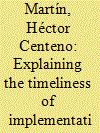

|
|
|
|
|
| Summary/Abstract |
Truth commissions are widely seen as important peacebuilding tools partially because they issue recommendations that seek to prompt further justice initiatives to address past abuses and promote institutional reforms that encourage non-repetition. Yet, despite growing interest in truth commissions among academics, policymakers, and activists, little attention has been paid to the recommendations that they outline in their final reports. In this article, we examine the factors that shape whether and when truth commission recommendations are enacted. Thus, we seek to explain not only whether recommendations are implemented, but also how quickly they are implemented. We use survival analysis to test the effects of a range of political and economic country-level variables, commission-specific qualities, and recommendation characteristics on the implementation record of nearly 700 recommendations formulated by ten Latin American truth commissions that operated between 1984 and 2014. The analysis yields interesting results, including that implementation proceeds more quickly in wealthier countries and when recommendations are issued by commissions created immediately after transitions, when the transitions occurred in which one side was victorious, and when commissions are created by an executive order. Moreover, recommendations that are directed towards the past are implemented more slowly than future-oriented measures.
|
|
|
|
|
|
|
|
|
|
|
|
|
|
|
|
| 2 |
ID:
054114


|
|
|
|
|
| Publication |
Lanham, Rowman & Littlefield, 2004.
|
| Description |
x, 281p.
|
| Standard Number |
0742535819
|
|
|
|
|
|
|
|
|
|
|
|
Copies: C:1/I:0,R:0,Q:0
Circulation
| Accession# | Call# | Current Location | Status | Policy | Location |
| 048691 | 323.49/AMS 048691 | Main | On Shelf | General | |
|
|
|
|
| 3 |
ID:
161344
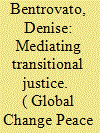

|
|
|
|
|
| Summary/Abstract |
Transitional justice (TJ) and education have recently evolved into key areas of concern in processes of recovery undergone by societies emerging from violent conflict. Referencing the particular case of post-apartheid South Africa, this article investigates the distinct role of school textbooks as mediators of TJ in order to shed light on the under-researched interconnections between these fields. Its analysis of how South Africa’s history textbooks engage with the work of the Truth and Reconciliation Commission explores the discursive and pedagogical strategies they adopt as they deal with this high-profile TJ mechanism. The article’s theorisation will consider textbooks’ possible dual function as both instruments and indicators of broader post-conflict transformation by assessing the possibilities offered by a pedagogical model of TJ education involving history textbooks as ‘heteroglossic spaces’ and as ‘mediators of multivocal discourses’.
|
|
|
|
|
|
|
|
|
|
|
|
|
|
|
|
| 4 |
ID:
117593
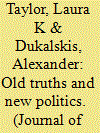

|
|
|
|
|
| Publication |
2012.
|
| Summary/Abstract |
This article analyzes the relationship between truth and politics by asking whether the 'publicness' of a truth commission - defined by whether it has public hearings, releases a public report, and names perpetrators - contributes to democratization. The article reviews scholarship relevant to the potential democratizing effects of truth commissions and derives mechanisms that help explain this relationship. Work from the transitional justice field as well as democratization and political transition more generally is considered. Using a newly-constructed Truth Commission Publicness Dataset (TCPD), the analysis finds that even after statistically controlling for initial levels of democracy, democratic trends in the years prior to a commission, level of wealth, amnesties and/or trials, the influence of the South African Truth and Reconciliation Commission, and different cutoff points for measuring democratization across a number of models, more publicness predicts higher levels of democracy years after the commission has finished its work. The more public a truth commission is, the more it will contribute to democratization. The finding that more public truth commissions are associated with higher levels of democratization indicates particular strategies that policymakers, donors, and civil society activists may take to improve prospects for democracy in a country planning a truth commission in the wake of violence and/or government abuse.
|
|
|
|
|
|
|
|
|
|
|
|
|
|
|
|
| 5 |
ID:
190171
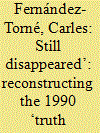

|
|
|
|
|
| Summary/Abstract |
Experts agree that in 1990, Nepal established a truth commission to investigate disappearances that allegedly happened between 1960 and 1990. Little is known about this truth-seeking mechanism. Most of what has been published refers to the Mallik Commission, a better-known commission established also in 1990. This Research Note presents new data on the Committee on Disappearances. It examines the process through which the Committee came to be and speculates that the main purpose for its establishment might have been to examine the disappearances of seven people in relation to the 1985 bombing, a series of explosions targeting the monarchy. The Note presents the main findings compiled in the Committee’s final report and examines the reasons why the final report was never published.
|
|
|
|
|
|
|
|
|
|
|
|
|
|
|
|
| 6 |
ID:
101697
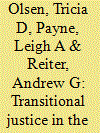

|
|
|
|
|
| Publication |
2010.
|
| Summary/Abstract |
This article presents a new dataset of transitional justice mechanisms utilized worldwide from 1970-2007. These data complement the growing body of quantitative and comparative analyses of transitional justice. This article summarizes three important contributions made by the dataset. First, it includes five transitional justice mechanisms (trials, truth commissions, amnesties, reparations, and lustration policies), allowing scholars to avoid many of the methodological errors committed by performing single-mechanism studies. Second, it provides an expanded sample, both temporally and geographically, to facilitate greater comparative and policy impact. Third, the dataset enables scholars to analyze transitional justice across a variety of political contexts, including democratic transitions and civil wars. These data illuminate a new set of general trends and patterns in the implementation of transitional justice worldwide. The findings show that countries adopt amnesties more often than other mechanisms. They predominantly grant them in the context of civil war and to opponents of the state, rather than state agents. Courts rarely prosecute those currently in power for human rights violations. In civil war settings, rebels, rather than state actors, face trials. In post-authoritarian settings, courts try former authoritarian actors, but do not address crimes committed by the opposition to authoritarian rule. The dataset also reveals regional patterns of mechanism usage. Trials, lustration policies, and reparations occur most often in Europe. Non-European countries more frequently adopt truth commissions and amnesties than do their European counterparts, with a particularly high number of amnesties granted in Latin America.
|
|
|
|
|
|
|
|
|
|
|
|
|
|
|
|
| 7 |
ID:
152503
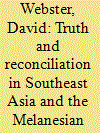

|
|
|
|
|
| Summary/Abstract |
Recent experiences with truth and reconciliation processes in Southeast Asia and the Southwest Pacific suggest that there is a role for historical research and memory in helping to build sustainable peace and stability in new nations—and conversely, that ignoring violent pasts undermines peacebuilding efforts. Two truth commissions have operated in this region, in Timor-Leste (East Timor) and Solomon Islands. There are also calls for truth and reconciliation processes in Indonesia at the national and local levels, including in (West) Papua. As the only Western developed country to have held a full truth commission, Canada could play a powerful role in promoting and supporting mutual dialogue on the implementation of truth and reconciliation outside its borders. We can derive both potential lessons and recommendations for Canadian action to promote truth and reconciliation processes from the cases of Indonesia, Solomon Islands, and Timor-Leste.
|
|
|
|
|
|
|
|
|
|
|
|
|
|
|
|
|
|
|
|
|